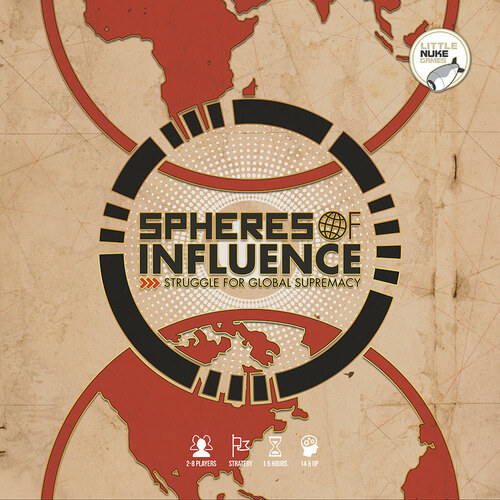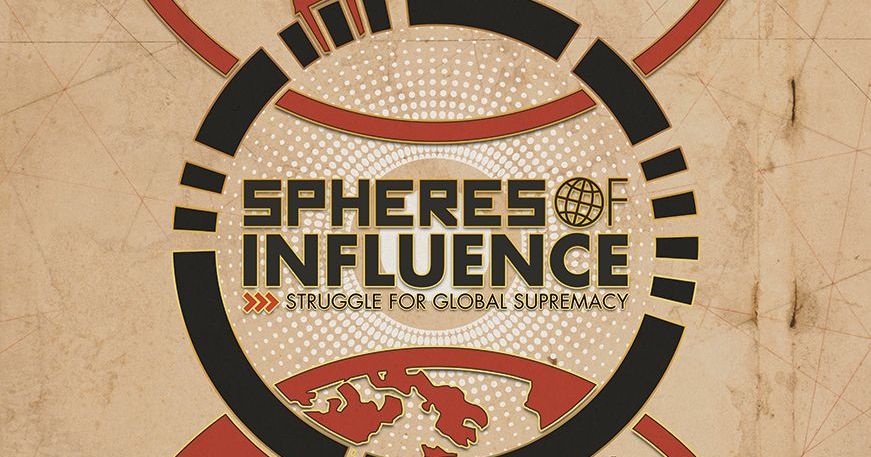
Spheres of Influence: Struggle for Global Supremacy
**Spheres of Influence: Struggle for Global Supremacy** is an intense strategy game set in a modern world full of geopolitical challenges. Players take command of one of 8 powerful factions, fighting to dominate spheres of influence, capitals and vital resources such as oil. At the start of the game, each faction begins with a single territory under its control, which will encourage aggressive expansion. With the game adaptable to smaller groups of less than 5 players, each can control between 1 and 4 factions, requiring coordination and cunning to deal with opposing alliances. Rounds consist of two main phases: mobilization and action turns. During the mobilization phase, players take turns positioning their units based on their strategic power, as well as preparing a global turn deck that determines the order of actions in the next phase. Revealing the cards in this deck creates an unpredictable dynamic, as the players don't know when they will have the chance to act, creating a climate of constant tension. In the turn phase, each faction carries out actions in its territory, making room for maneuvers, attacks or defenses. Combat is optimized by simple dice mechanics, complemented by situational modifiers that reflect the complexity of modern warfare, such as attacks on defended coastlines or resistance in fortified areas. In addition, special cards add an extra layer of depth to the game, allowing tactics such as the use of submarines, heavy armor or destructive nuclear attacks. With games taking place over 5 or 6 rounds, depending on the number of factions, the match reaches a climax quickly. The player who controls the most spheres of influence at the end of the game will be victorious. On average, a match takes around an hour and a half, allowing even the most experienced players to finish in an hour, making **Spheres of Influence** an engaging and exciting experience for strategy lovers.Artists: ;
Designers: Josh Lamont;
Date: 2016
Note: -
Mechanics: Influence / Majority in the Area, Point-to-point movement, Variable phase order, Shift order: Random, Action Points, Data Scrolling
Topics: War
Table of Contents
- How to Play
- Tips for playing
- Game mechanics
- Game components
- Additional Information
OBJECTIVE OF THE GAME

Tips for playing
Here are some tips for doing better in the game Spheres of Influence: Struggle for Global Supremacy:
- Always evaluate the alliances available; strategic partnerships can change the course of the match in your favor.
- Keep a balance between expansion and defense; focusing on just one can leave you vulnerable.
- Manage your resources wisely; distribute them according to your priorities and momentary needs.
- Observe your opponents' movements; anticipating their actions can give you critical advantages.
- Use diplomacy to influence results; negotiations can open doors that battles cannot.
- Focus on regions with high strategic influence first to maximize your control in the game.
- Be prepared to adapt your strategy as the game progresses; flexibility is crucial to success.
Video about the game
GAME mechanics
- Influence / Majority in the Area - This mechanic allows players to expand their power by conquering and maintaining control over specific regions of the map. By gaining the majority of influence in an area, a player takes control of that region, gaining strategic benefits and preventing opponents from gaining similar access and advantages.
- Point-to-Point Movement - The game map is divided into connected points that players use to move their units strategically. Each point represents a location that can be occupied or crossed, and movement between points is essential for planning attacks and defenses, offering a network of paths for tactical maneuvers.
- Variable Phase Order - The phases of the game do not follow a fixed sequence each round. The order in which the different phases of the game take place can change with each game, providing greater variability and challenging players to adapt their strategies in real time as the sequence of the phases changes.
- Data Scrolling - The game uses dice to determine the outcome of conflicts and random events. This mechanic introduces an element of luck, where players must consider risks and probabilities in their tactical decisions, impacting the success of actions such as combats and territorial conquests.
- Action Points - Each player receives a limited amount of action points to spend on their moves. These points can be used to move units, carry out attacks or perform special actions, requiring players to carefully manage their resources to maximize the efficiency and impact of their decisions.
- Shift Order: Random - The turn order is determined randomly each round, preventing any player from settling into a static position of advantage. This system adds an unpredictable factor to the game, forcing constant adaptations of strategy as the turn order changes unexpectedly.
Game components
See all the items in the game below Spheres of Influence: Struggle for Global Supremacy:
- Control sheets
- Action Cards
- Game Board
- Influence Markers
- Unit parts
- Event Cards
- Conflict data
- Quick Reference
Additional Information
- Ludopedia link: https://ludopedia.com.br/jogo/spheres-of-influence-struggle-for-global-supremacy
- Link Tabletopia:
- Amazon Brazil link: Comprar Spheres of Influence: Struggle for Global Supremacy
- Amazon USA link: Comprar Spheres of Influence: Struggle for Global Supremacy


